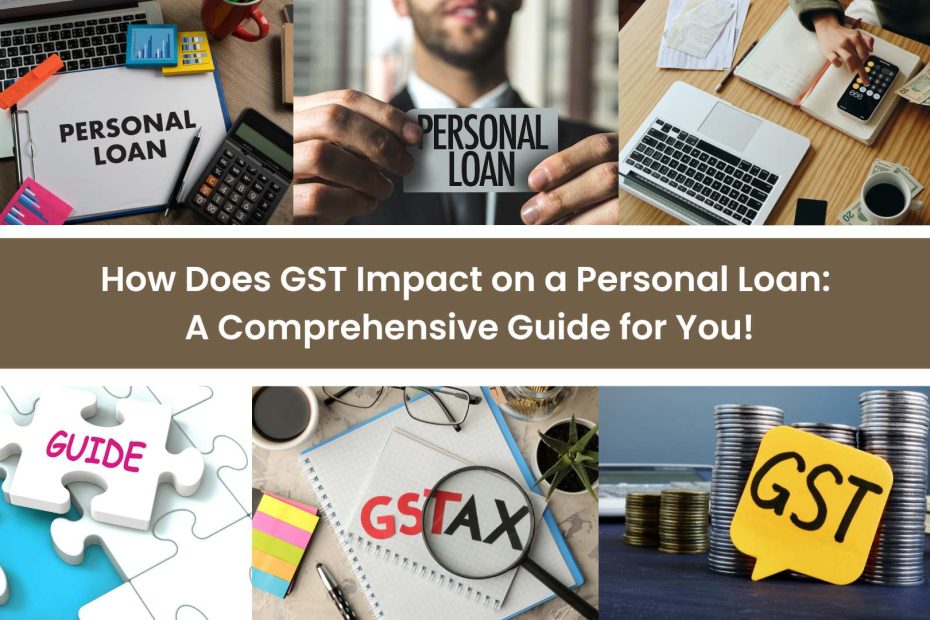Interest rates, terms, and accessible payment plans are usually taken seriously when checking out personal loans. The impact of GST is among the most crucial factors that people ignore… The implementation of the GST in 2017 simplified indirect taxation. Nonetheless, it affected a number of Indian business sectors, most notably financial services.
What Effect Does GST Have on a Personal Loan’s Common fees?
Personal Loans and GST
Personal loans are multipurpose loans for weddings, travel, and emergencies. However, the GST, which is now fixed at 18%, covers several expenses associated with these loans. You can lower your expenses by paying these costs.
1. Processing Fees
Financial firms charge a processing fee to process your loan application. This fee is inclusive of 18% GST. Example: 2.5% processing fee on a loan of ₹2,00,000 is ₹5,000. Adding 18% GST (₹900) makes the total processing fee ₹5,900.
2. Prepayment Charges
Repaying your loan early? There is a fee for prepayment or foreclosure, with GST additionally applicable at the rate of 18%.
Example: If the prepayment charge is 4% on a loan of ₹1,50,000, the fee is ₹6,000. Adding GST (₹1,080), the total cost rises to ₹7,080.
3. Other Charges
GST is also levied on penalties like late payment fees, cheque bounce fees, and collection charges.
Example: If a late payment penalty is ₹2,500, GST of ₹450 increases the total penalty to ₹2,950.
4. Interest Payments
GST does not apply to interest payments. Since interest is not considered a service, your EMI (including principal and interest) remains unaffected.
Advantages of GST on Personal Loans
Despite the additional cost, GST has improved transparency and efficiency in financial services:
1. Standardization and Transparency
GST ensures a uniform tax structure across lenders, making personal loan charges more transparent.
2. Simplified Taxation System
Before GST, multiple indirect taxes (like VAT and service tax) created confusion. GST replaces them with a single tax, reducing complexity.
3. Streamlined Loan Process
The loan approval and disbursement process has become faster and more efficient under GST.
4. Potential Cost Benefits
Over time, operational efficiencies from GST may lead lenders to lower processing fees, benefiting borrowers.
Disadvantages of GST on Personal Loans
While GST offers benefits, there are drawbacks:
1. Increased Initial Costs
The 18% GST on processing fees, documentation charges, and penalties increases borrowing costs.
2. Impact on Loan Affordability
For borrowers with tight budgets, these additional costs may reduce loan affordability.
How to Reduce GST on Personal Loans?
While GST is unavoidable, you can minimize its impact with smart planning:
1. Compare Loan Offers
Different lenders charge different processing fees and prepayment penalties. Comparing them helps reduce GST-related costs.
2. Negotiate with Lenders
Some lenders may waive or reduce processing fees, indirectly lowering your GST burden.
3. Plan Your Finances
Factor in GST on processing fees while budgeting to avoid unexpected costs.
4. Avoid Prepayment & Late Payment Penalties
Pay your EMIs on time to avoid penalties that attract GST.
Consider prepayment only if it offers significant interest savings after adding GST.
5. Seek Financial Advice
Consult a financial expert to optimize loan costs and avoid unnecessary charges.
Conclusion
GST on personal loans increases borrowing costs, but careful planning can help reduce its effects. Opt for lenders with low fees and prepayment charges, and compare loans to ensure affordability.
For competitive rates and minimal fees, through Refer Loan you can get transparent terms and a customer-focused approach for a smooth loan experience while managing GST costs effectively.
FAQs
Why is GST not applied to loan interest?
Interest is not considered a service and is exempt from GST under Indian tax laws.
How can I calculate GST on processing fees?
Add 18% to the processing cost.
Example: If the processing fee is ₹1,500, GST will be ₹1,500 × 18% = ₹270.
Is GST charged on balance transfer loans?
Yes, GST applies to processing and documentation fees during a loan balance transfer.
Are GST charges refundable if my loan application is rejected?
Since processing fees (and GST) are deducted only after approval, if your loan is rejected, GST is not applicable.
By staying informed, you can make better financial decisions and reduce unnecessary loan expenses!
